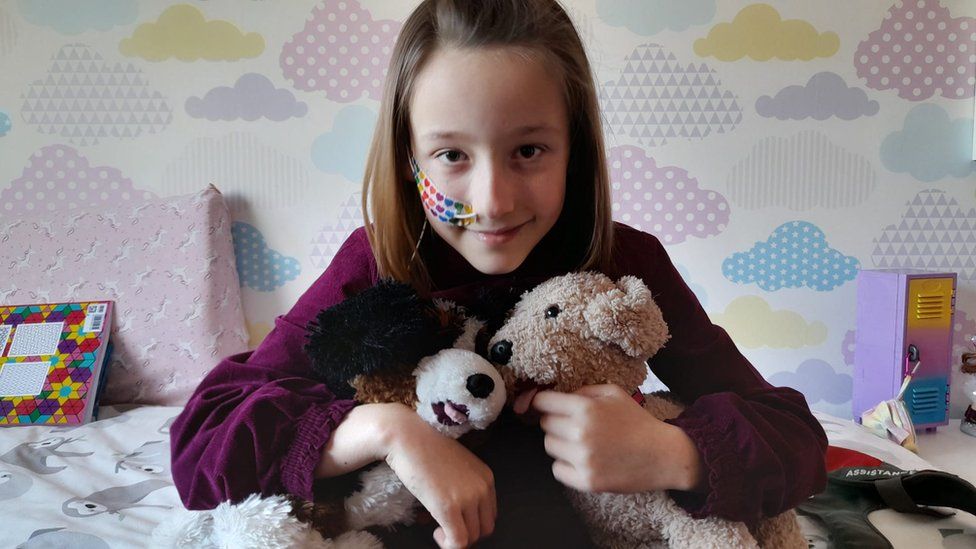Tube feed questions and face touching upset girl

How would you feel if the first question many strangers asked was "what's wrong with you?" or "what's that on your face?"
That is the reality for 11-year-old Imogen from Caldicot, Monmouthshire, who said she has had enough after people started touching her face.
Imogen has cerebral palsy and has been fed through a tube since last March because she was unwell and losing weight.
"The most annoying thing possible with people, and adults do this too, is they stare at you and because it's on my face they keep eye contact with the whole time," she said.
"Normally I just stare at the floor and then they stop."
BBC Wales is following Imogen and her mum Catherine over the next year, as they navigate challenges that are faced by many families with a disabled child - accessing education and other services and seemingly endless medical appointments.
Imogen has been home-schooled since she was six because her mum has been in dispute with the council about her needs, including over the provision of disabled toilets.
Monmouthshire Council said all schools in the county had disabled toilets.
Bespoke toilet facilities had been installed for Imogen, it added, in schools identified by the family, as well as providing training and resources to staff.
She hopes to re-enter mainstream education this year and start secondary school in September.

[Imogen sitting on her bed in her bedroom holding two soft toys]
Imogen has been undergoing treatment to try to help her walk and since September she has been in casts to stretch her muscles and could walk short distances in them.
Last week, she tried new splints to give her better support, but the transition has not been straightforward, so for the moment it means that Imogen has to rely on her wheelchair again and crawl up the stairs in her house.
There will be more doctors appointments, so it is a big year ahead, but one of the main things Imogen wants is to talk about is how people behave around her.
"People grab your face. Touch you," she said. "Once a random child picked this up [her tube] and said 'what is this?'
"The thing I struggle with is when I am with my friends who are all in wheelchairs, they get it," she said. "But when I am trying to make friends with new people, the first question is always 'what's that thing on your face?'
"It's sometimes hard to explain because, especially a lot of children don't understand the medical terms of it," she said. "Sometimes I just say to the younger ones, it helps me stay strong like a superhero. It's annoying."
Catherine says they became used to people staring when Imogen was younger and in her wheelchair but that was happening less as she has got older.
But since having the tube fitted last year, Catherine said it became much more noticeable, recalling a difficult shopping trip before Christmas when they were stared at the whole time.
"Staring at her makes her feel really uncomfortable and self-conscious," said Catherine, who is Imogen's full-time carer. "And I think people probably just don't realise how uncomfortable it makes her feel.
"Actually if they were to decide to spark up a conversation, not just touch her and stare. But it's also how they ask. Sometimes we get 'what's wrong with you? Or 'we hope it's not permanent'."
"I would happily talk about it, if they asked me," Imogen said. "They could have said, 'if you don't mind me asking, not meaning to be rude, why are you a wheelchair user?'
"It just depends how they ask really. It's ok to ask questions. We are not going to take offence."
Imogen is sport mad and plays tennis for Wales, as well as loving horse riding and basketball, swimming and surfing.
So if you see her and her mum out on the court or on the beach, they are hoping you might stop and think about what you say and do around her and other people with disabilities.
Categories
- All Categories
- 15.7K Start here and say hello!
- 7.5K Coffee lounge
- 105 Games den
- 1.8K People power
- 157 Announcements and information
- 25.2K Talk about life
- 6.2K Everyday life
- 506 Current affairs
- 2.5K Families and carers
- 895 Education and skills
- 2K Work
- 576 Money and bills
- 3.7K Housing and independent living
- 1.1K Transport and travel
- 642 Relationships
- 1.6K Mental health and wellbeing
- 2.5K Talk about your impairment
- 878 Rare, invisible, and undiagnosed conditions
- 937 Neurological impairments and pain
- 2.2K Cerebral Palsy Network
- 1.2K Autism and neurodiversity
- 40.6K Talk about your benefits
- 6.1K Employment and Support Allowance (ESA)
- 20.2K PIP, DLA, ADP and AA
- 9K Universal Credit (UC)
- 5.3K Benefits and income